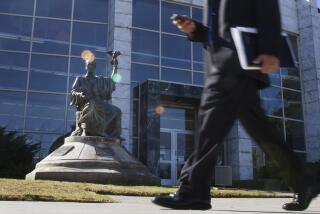Italy May Revive Its Investigation Into Iraq Loan Fraud : Gulf War: Senate panel would explore $5 billion in aid to Hussein through bank’s Atlanta branch. The move reflects concern in press, political circles.
- Share via
ROME — Italy’s Senate is considering a proposal to revive an investigation here into the role that government-owned Banca Nazionale del Lavoro and various Italian companies played in an Iraqi arms buildup before the Persian Gulf War.
A proposal awaiting approval by the full Senate would create a 20-senator commission to explore the $5 billion in loans made to Iraq by BNL’s branch in Atlanta while Iraq was at war with Iran.
Maneuvering for the new inquiry reflects belated but growing Italian press and political concern about the scandal, which is understood here to be as much about international political machinations as it is about money.
An earlier Senate investigation into the loans made between 1985 and 1989 was short-circuited last spring when Parliament was dissolved for elections. Investigators said in a report in April that they had been unable to determine if BNL’s role in the scandal was the result of “negligence or connivance.”
Christopher P. Drogoul, the American manager of BNL’s Atlanta branch who faces federal fraud charges, has said that he made the loans to Iraq with the knowledge of the bank’s officials at their headquarters here. After a long sentencing hearing, an Atlanta judge on Oct. 1 ordered that Drogoul be tried in the case, throwing out a guilty plea in which the bank manager had said that he had acted alone.
The bank’s new managers, brought in to replace officials disgraced in Rome by the scandal, said that there is no evidence to show BNL headquarters was aware of Drogoul’s lending to Iraq.
In the view of major Italian newspapers and opposition politicians, however, that assertion is laughable. They say that it is unthinkable a bank branch could have authority to negotiate multibillion-dollar international deals without the knowledge of its headquarters.
Italian suspicions of a cross-Atlantic cover-up have been fueled by press reports from Washington that a CIA cable from the American Embassy in Rome discussed speculation that the bank’s top officials knew about the loans.
The embassy would not discuss the cable, but Ambassador Peter Secchia said in an interview Wednesday that he has seen no evidence of any Italian--or American--attempt to sidetrack the investigation.
“Nobody in the Italian government has leaned on me, pressured me or asked me for information about the investigation for the three years I have been ambassador here,” said Secchia. “Nobody has talked to me about any cover-up.”
After the scandal broke, Secchia said, Giampiero Cantoni, the new BNL president, visited the embassy to ask that the U.S. investigation take into account the political impact of the scandal on Italy.
Ambassador Secchia told Cantoni that he would not comment on a matter under criminal investigation but said that he would pass along the bank’s concerns, the ambassador recalled.
Massimo Riva, a leftist Italian senator who was vice chairman of the earlier Senate investigating committee, said he believes that there is fertile ground for a new inquiry.
“The big news will come if it turns out that BNL in Rome not only knew about the loans but that there were big payoffs associated with them,” he said.
Majority-owned by the Italian government, Banca Nazionale del Lavoro and its management have long been close to the Italian Socialist Party, which in turn has long been a key member of Italian governments, including the current one.
On the Italian left, there is a conviction that BNL was used as a conduit for loans to Iraq by an obedient Italy at the request of the United States.
The bank’s assertion that its managers in Rome knew nothing of Drogoul’s loans to Iraq is challenged by the report of the first Senate investigation. It lamented, without specifics, that “the attempt to cover up the real mechanism of the bank fraud certainly does not correspond to the premise of a crime carried out exclusively by Drogoul and his accomplices.”
Sen. Riva, who did not seek reelection, said that there is already overwhelming anecdotal evidence that Drogoul did not act alone.
The Senate report noted that in 1989, a few weeks before the FBI raided the BNL branch in Atlanta, a steel company in Udine that won $70 million in contracts with Iraq asked BNL Rome for financing. It was referred to BNL Atlanta, which issued a letter of credit, according to the Senate report.
In 1988, Riva said, an overdue audit uncovered irregularities at the Atlanta branch. The auditor’s report was sent to Rome by BNL New York in December, 1988. It brought no response from BNL Rome, which told inquiring officials in New York in February of 1989 that the report had never arrived.
Rome acknowledged receipt of a copy in March, 1989, but since it was in English, the official story is that it had to be translated, Riva said. The translation came back four months later, on the eve of FBI raids in August.
More to Read
Sign up for Essential California
The most important California stories and recommendations in your inbox every morning.
You may occasionally receive promotional content from the Los Angeles Times.













